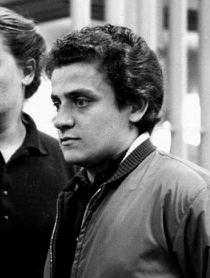Irina Press
Irina Natanowna Press ( Russian Ирина Натановна Пресс , Ukrainian Ірина Натанівна Пресс ; born March 10, 1939 in Kharkov , Ukrainian SSR ; † February 22, 2004 in Russia) was a Soviet athlete in the 1960s. Together with her older sister Tamara Press , also a track and field athlete, she was one half of the so-called “Press Brothers”, who won almost everything there was to win.
Sporting successes
At the Olympic Games in Rome in 1960 , Irina became Olympic champion in the 80-meter hurdles , at the Olympic Games in Tokyo in 1964 she won the pentathlon, which was then newly introduced .
She set a world record in the 80-meter hurdles with a time of 10.4 seconds at the first women's athletics European Cup in 1965 in the Auestadion ( Kassel , Germany ).
The end as the beginning of the questions
It was said of the two sisters that their gender could not be determined. They were soon considered by some to be at least hermaphrodites ; according to another opinion they were doped with male hormones. Scoffers called the two "Press Brothers". After gender tests became compulsory for all international female athletes in 1966 (these tests were abolished in Sydney in 2000), both female athletes disappeared from the sports stage.
The Western press took this withdrawal as an admission. The Russian newspapers deny this to this day.
Your place in contemporary history
The Press sisters symbolized the happy time of the Soviet Union after Stalin's death. The thaw prevailed that later shaped the politics of Mikhail Gorbachev . Tamara and Irina were the most popular sportswomen in the USSR , their biographies typical of that period:
The father died in the war. They grew up far from their homeland, as it was occupied and destroyed by German troops. Later they graduated from Leningrad State University .
The time after competitive sport
After their candidacy before the 1966 European Championships was withdrawn by the Soviet Union, the two pursued professional careers. Irina went to the border troops of the KGB and became an officer there. Tamara became a civil engineer, wrote numerous specialist books about her profession, but also about sport. Later both held all kinds of honorary posts in Russian sport.
Western coverage
Although it has not yet been possible to medically prove that Irina Press is not a woman or an intersexual person, the western media systematically worked on suspicions. When the Soviet sportswoman stayed away from future sporting events after the mandatory sex tests were introduced in 1966, rumors in the western media that she was not a real woman became entrenched.
So far, there is only one scientific study that deals with the gender portrayal of Irina Press in the contemporary western press. In this, the sociologist Dennis Krämer argues from a post-structuralist point of view that the media at the time systematically portrayed Irina Press' female gender as well as that of her sister Tamara , not because it showed male traits, but primarily because the Soviet sportswoman in in stark contrast to the western conservative ideal of women of the delicate housewife and mother of the time. The threats that were recognized in her as an athlete did not originate from her genuine body, but were in direct political relation to the conflict situation at the time during the Cold War. Against this background, the body of the Soviet sportswoman was primarily seen as alien, different, strange and abnormal because the manipulative influence of an ideological machine of communism during the Cold War was suspected behind her appearance .
Web links
- Irina Press in the Sports-Reference database (English; archived from the original )
Individual evidence
- ↑ Irina Press - Soviet athlete ( English ) Encyclopædia Britannica, Inc .. 2004. Retrieved February 26, 2009.
- ↑ It all started in 1953 . A brief history of the Auestadion. In: Hessisch Niedersächsische Allgemeine (Hrsg.): Special topic Auestadion . October 22, 2010.
- ↑ Dennis Krämer: Media Practices of Gendering. Tamara and Irina Press in the Western sports discourse during the Cold War . In: Gabriele Klein, Hanna Göbel (Hrsg.): Performance and Practice. Practical explorations in dance, theater, sport and everyday life . Transcript, Bielefeld 2017, ISBN 978-3-8376-3287-3 , p. 191-209 .
| personal data | |
|---|---|
| SURNAME | Press, Irina |
| ALTERNATIVE NAMES | Press, Irina Natanovna (full name); Пресс, Ирина Натановна (Russian); Пресс, Ірина Натанівна (Ukrainian) |
| BRIEF DESCRIPTION | soviet athlete |
| DATE OF BIRTH | March 10, 1939 |
| PLACE OF BIRTH | Kharkov , Ukrainian SSR |
| DATE OF DEATH | February 22, 2004 |
| Place of death | Russia |

